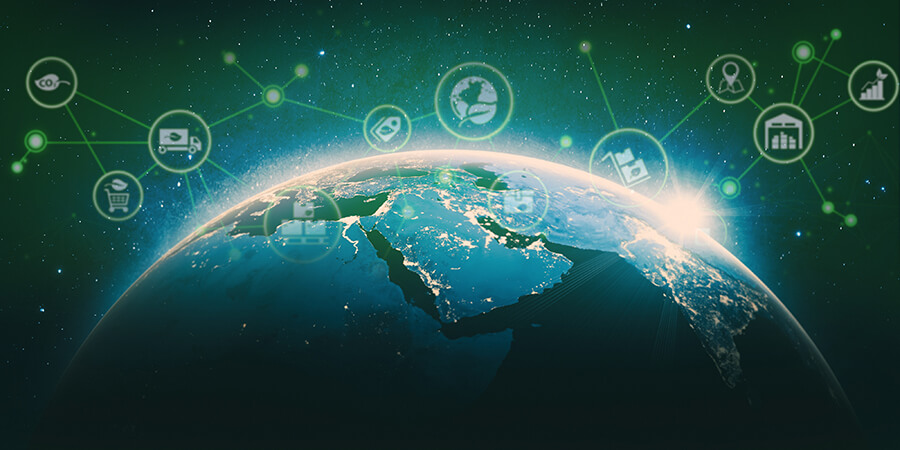The expansion of cloud computing and the rapid integration of Generative AI across various domains, from email and search to food delivery apps, are driving an increase in the number of data centers. In the near future, the construction of hundreds of data centers annually is anticipated to meet the growing demand of customers. This poses a challenge for companies committed to achieving carbon negativity and water positivity. Despite ongoing technological advancements in efficiency, data centers still consume substantial amounts of energy and water, particularly in evaporative cooling systems designed to prevent equipment overheating. On a global scale, the industry is estimated to use around 200 terawatt-hours of electricity each year.
In the Middle East, large data centers, characterized by high-density computing power, may not seem like the most likely venues for pioneering sustainability approaches. However, there is a recent emphasis on addressing environmental concerns within the industry, with a focus on improving efficiency, offsetting emissions, and transitioning to renewable energy sources. Many of these data centers are adopting green building principles, establishing environmentally conscious infrastructures that prioritize energy efficiency and minimize their overall environmental impact.
Energy Efficiency and Sustainable Buildings
In the region, experts believe that a promising path forward involves a reliance on clean energy and a novel approach to constructing energy-efficient data centers. The emphasis is on the comprehensive process of designing, building, and operating data centers that prioritize energy efficiency and sustainability throughout the region.
This endeavor requires collaborative efforts— as individual endeavors are insufficient. Instead, it necessitates partnerships among stakeholders to bring about developments such as the establishment of a solar photovoltaic plant to supply renewable power.
An illustrative case can be observed in the UAE, where the country is diversifying its economic landscape and nurturing a digital economy. Many companies are gearing up to develop facilities that can meet the escalating demand for advanced digital infrastructure. These initiatives not only support businesses in enhancing their digital resilience and transformation but also contribute significantly to the overall growth of the UAE's digital economy.
Collaborating Towards a Sustainable Tomorrow
In recent times, companies have been actively implementing strategies aimed at attaining net-zero waste standards and certifications. A prevailing ‘durable-first’ approach, embraced by many, prioritizes minimizing waste generation. This involves a concentrated effort to reduce water consumption and introduce measures such as water reuse and recycling.
A noteworthy innovation in the new data centers of the UAE involves the adoption of adiabatic-free cooling chilled water technology. This design ensures efficient cooling, even in challenging environmental conditions (and during temperature peaks). The adiabatic-free cooling chillers not only provide increased capacity but also result in substantial energy savings while operating with minimal noise.
Forging a Sustainable Digital Frontier
The progression of data centers is intricately linked to the infusion of sustainable practices into their operations. The future envisions a dedication to green building principles, emphasizing the utilization of eco-friendly construction materials, efficient insulation techniques, and the optimization of natural lighting sources.
In the pursuit of heightened energy efficiency and enhanced air quality, upcoming data centers may integrate innovative features, such as green spaces or vertical gardens within their structures. These sustainable strategies aim not only to optimize resource utilization, but also to mitigate the environmental impact associated with meeting the escalating demands of computing.
Embracing a green ethos, the data centers of the future will prioritize modular and energy-efficient principles. They will employ cutting-edge methods, including the adoption of green power, water reclamation, zero water cooling, recycling initiatives, and upgraded power sources. Through the implementation of these forward-thinking practices, data centers can achieve the dual objectives of optimal energy efficiency and sustainability.
Additionally, the introduction of Edge computing plays a pivotal role in reducing energy consumption and lessening the environmental footprint. By processing data closer to its source, smaller, localized data centers can be established, contributing significantly to the development of a more sustainable digital infrastructure.
Through the collective adoption of these strategies, the future landscape of data centers is poised to lead a transition towards a harmonious fusion of sustainability and efficiency. This signifies a transformative journey towards a greener and more environmentally-conscious digital infrastructure for future generations.










